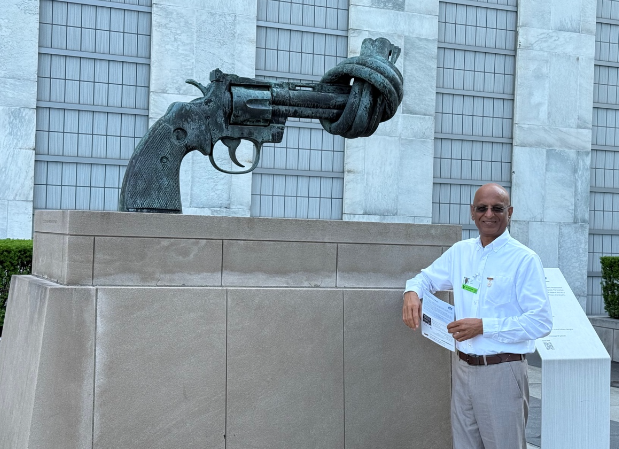Caption: Vijai Sadal at the Peace Monument outside the United Nations building in New York
By Vijai Sadal
WHILE global conversations focus on peace between nations, the foundation of peace begins with the individual. Peace is not only the absence of conflict but the presence of inner stability, clarity, and harmony.
Stability in Life
People who maintain a peaceful state of mind, are less likely to be swayed by external pressures or emotional impulses. This stability protects mental health and improves resilience in the face of stresses. A Johns Hopkins University review of 47 clinical trials concluded that mindfulness, prayer, and meditation is as effective as antidepressants in treating mild to moderate anxiety and depression. Peace is a practical tool for a healthier life.
Inner peace provides the foundation for emotional stability. Neuroscience shows that practices such as meditation reduce stress, calm the nervous system, and promote balance in the brain. A 2016 study in Biological Psychiatry revealed that meditation strengthen regions of the brain linked to decision-making and emotional regulation.
Peace in the Family
Personal peace has a profound influence on family life. A peaceful parent or partner creates a home atmosphere of safety, respect, and love. Children raised in calm, stable households are more likely to develop emotional intelligence, perform better in school, and form healthy relationships later in life. Research from the Child Development journal shows that parental emotional regulation significantly reduces children’s behavioral problems and increases their social competence.
In families where peace is practiced conflicts are resolved with understanding, tolerance and positive action. This strengthens bonds between family members and sets a model for the next generation. The values of patience, respect, and cooperation learned at home extend into schools, workplaces, and communities
Peace in the Workplace
Peaceful leadership also supports sustainable growth. A study in Organizational Behavior and Human Decision Processes (2020) demonstrated that cooperative leadership boosts group performance by up to 25%. Businesses led with peace and respect foster loyalty, reduce turnover, and increase collaboration. In contrast, high-stress, aggressive workplaces see higher absenteeism and greater overheads. Workers who cultivate inner calm are more focused, creative, and resilient. This enhances performance, problem-solving, and teamwork that in turn, give businesses a competitive edge in today’s complex environment.
Peace in the Community
Peaceful people build peaceful environments. Studies by the World Health Organization indicate that societies where people report higher life satisfaction and lower stress also have reduced levels of violence and crime. Communities shaped by mutual respect are safer, healthier, and more prosperous. In neighborhoods, peaceful interactions foster volunteering, shared responsibility, and stronger social ties. These outcomes show that peace is not abstract; it is measurable in the improved quality of daily life.
Peace and Cooperation is not only about avoiding conflict—it is about generating positive outcomes together. Peace allows people to listen more fully, negotiate more effectively, and reach agreements that benefit all parties.
Aggression and Its Costs
It is worth noting that aggression often produces the opposite effect. Violence and hostility create short-term control while undermining trust, safety, and cooperation. According to the Institute for Economics and Peace, violence costs the global economy more than $14 trillion annually in lost productivity, health care, and security.
Modern life brings constant noise, digital distraction, and pressure to perform. Conflicts in relationships, financial stress, and uncertainty in the wider world can easily disturb inner calm. Studies in The Lancet Psychiatry show that excessive screen time and social media use are strongly linked to higher stress and reduced well-being.
Maintaining Peace
Peace must be cultivated deliberately, with healthy boundaries, rest time, and mindful responses to stress. Methods such as daily meditation, journaling, and gratitude exercises help to center the mind and reduce stress. Spending time in nature, nurturing positive relationships, and practicing deep breathing can also create moments of calm. Many individuals also find peace through spiritual practices, community service, or acts of kindness, which shift focus away from self-concern and toward meaningful connection with others. These habits strengthen emotional balance and help people carry a sense of peace into their daily interactions.
Conclusion
Personal peace is a powerful force with far-reaching effects. If you can find the strength to hold your peace, it will create stability for the individual, strengthens business performance, and fosters cooperation in communities. Scientific research confirms that peaceful practices enhance mental health, productivity, and social trust.
In today’s fast-paced and interconnected world, personal peace is a necessity. It is the quiet strength that allows individuals, businesses, and communities to flourish together.
Vijai Sadal is a student of the Brahma Kumaris Raja Yoga Meditation Centre. He can be reached at vijai@pepesmkt.com
![]()













